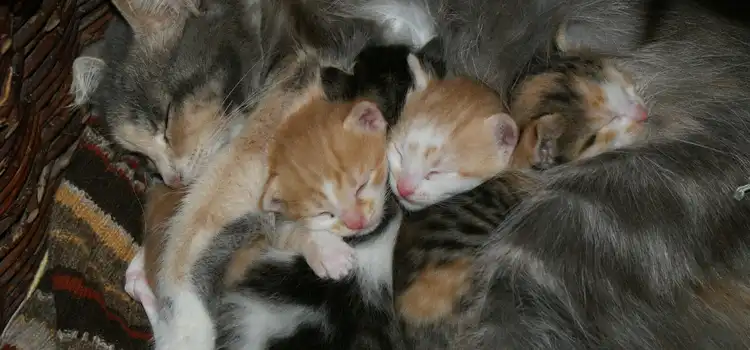The name “kitten” is synonymous with the image of fuzzy, wide-eyed baby cats batting playfully at dangling toys. But have you ever wondered why we refer to baby cats by the amusing name of kittens? Where did this term originate?
Baby cats are called kittens due to the Middle English word “kitoun”, meaning young cat. The word “kitten” emerged in the 1500s to describe energetic, playful young felines in their first year of life.
If you’ve ever wondered about the unique name for baby cats and want to discover the stories and meanings behind it, you’re in for an enlightening journey through the world of feline linguistics and history.

Etymology of “Kitten”
The name kitten has evolved over centuries:
- Old English “Catt”
The general word for cat dates back to around 700 AD in “catt”, derived from the Latin “catta.”
- Middle English “Kitoun”
By the 1300s, “kitoun” defined a young cat or kitten, with “cat” denoting adult felines.
- Rise of “Kitten”
By the 1500s, “kitten” emerged as the common term for a juvenile playful cat.
So our modern word kitten stems from an ancient differentiation between grown cats and energetic, growing kittens.
Cultural and Historical Significance
The term “kitten” holds cultural and historical significance in the world of felines:
- Endearing and diminutive
The use of the word “kitten” conveys a sense of endearment and diminution, reflecting the small size and adorable nature of these baby cats. It highlights the affection and care that humans have for these tiny creatures.
- Connection to mother cats
The use of ‘kitten’ reinforces the connection between baby cats and their mother. Just as ‘puppy’ is associated with dogs, ‘kitten’ strengthens the bond between mother cats and their offspring.
Unique Traits of Kittens
The name kitten perfectly encapsulates the distinct traits of baby cats:
- High Energy: Kittens are energetic, acrobatic, and fascinated by everything, eagerly pouncing and racing around. The word kitten reflects a lighthearted youthful spirit.
- Rapid Growth: Kittens develop quickly from helpless newborns to rambunctious youths within one year. The word mirrors their swift changes.
- Soft Features: Fluffy fur, rounded faces, and big eyes give kittens softened, delicate features denoting their youth and innocence.
- Playfulness: Kittens love to play, chasing, wrestling, and attacking their toys and littermates. The name kitten invokes a sense of gleeful playtime.
Why they Are Called “Kitten”?
Several factors contributed to “kitten” becoming the standard term:
- Differentiation From Adult Cats: Having a separate name for juveniles became useful in distinguishing ages, abilities, and needs.
- Increased Cat Popularity: As cats became more domesticated as pets, cuter names like kitten emerged to represent their young.
- Perfect Description: The word kitten just perfectly encapsulated the energetic, rapidly developing nature of baby cats.
The name resonated well with cat enthusiasts charmed by kittens’ unique antics.
Final Thoughts
So there you have it! When it comes to why we call baby cats kittens, the answer lies in an ancient word evolving to encapsulate the delight of raises these furry, energetic, mischievous, and adorable little felines. From tiny clumsy newborns to rambunctious pouncing youths, the word kitten just perfectly describes the wonder of experiencing cat parenthood from the first weeks through the first year. Thanks for reading! Please share your own stories of kitten hijinks below!
Quick Facts
What Does Kitten Mean In Different Languages?
While English uses “kitten”, other languages have equally adorable names for baby cats, like “chaton” in French, “kätzchen” in German, “gatito” in Spanish, and “gattino” in Italian.
Can You Call An Adult Cat A Kitten?
While some people may affectionately use “kitten” for adult cats, technically kittens are defined as cats under one year old. Once a cat is mature over one year, it would be more accurate to refer to them as a cat, feline, or other adult terms.
Do Boy And Girl Kittens Have Different Names?
There are no differences in the common word kitten used for both male and female baby cats under one year old. The sex-specific terms “tomkitten” and “queenkitten” are sometimes used, but kitten is generally the standard regardless of gender.
When Do Kittens Stop Being Called Kittens?
There is no set date when a kitten graduates to a cat, but generally around one year old when they reach sexual maturity they transition from “kitten” to “cat”. The change is gradual but by one year adulthood is reached.
What Should You Not Name A Kitten?
Avoid kitten names that are difficult to pronounce or remember, human names that could cause confusion, and negative or insulting terms. Choose kitten names that are cute, playful, and upbeat to match your kitten’s personality.
